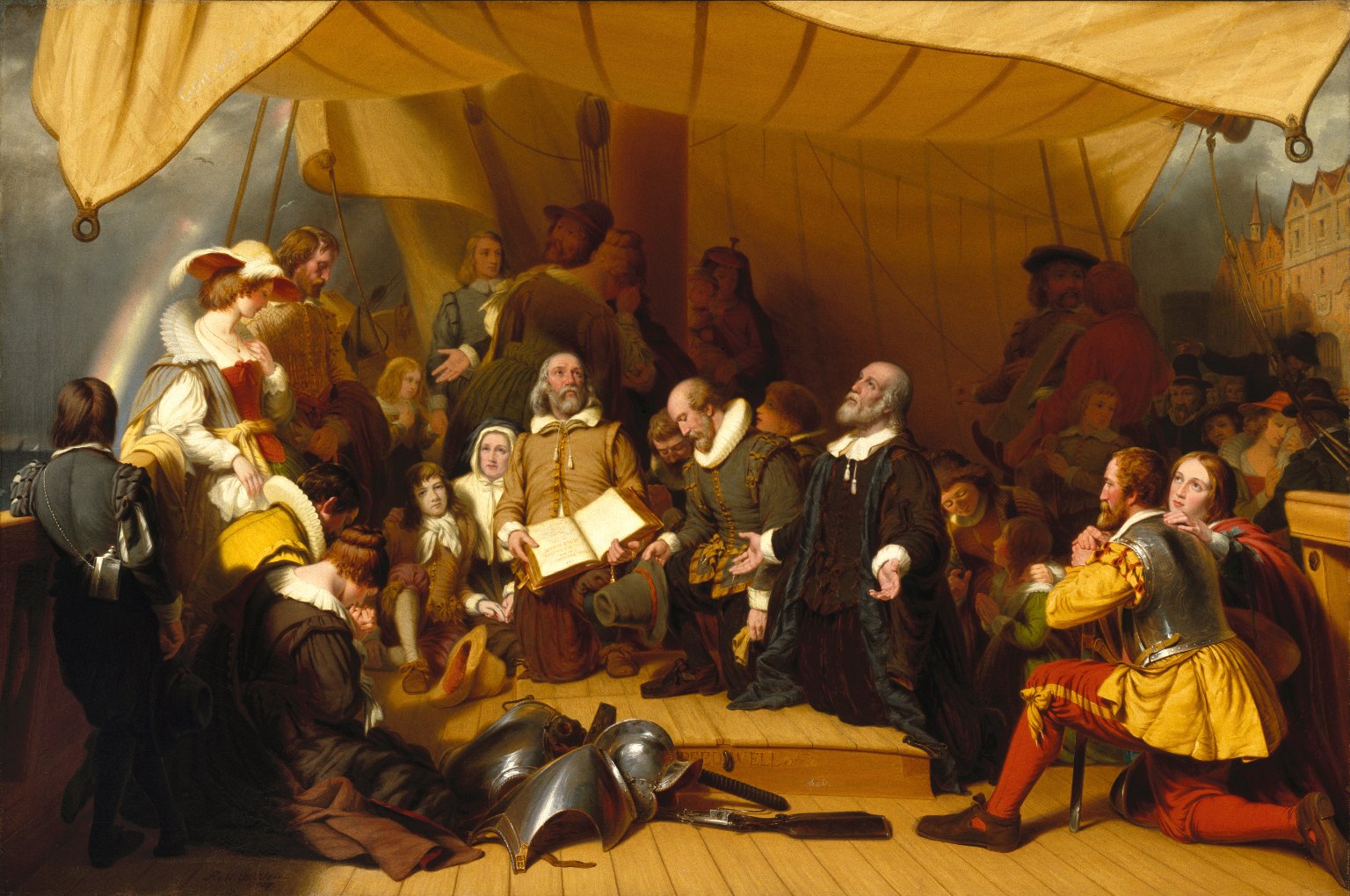
Nina Moore, in her 1888 book, “Pilgrims and Puritans”, tells their story. Our earliest Founding Fathers came to a bold, virgin New England because life in Britain became intolerable. The tyrant, King James I, refused “the common will”. He said, “a king is above law…a king can do no wrong.” He wanted religious control: “I will have one doctrine, one discipline, one religion…I will make [the people] conform.” The Pilgrims, who began as the Scrooby Separatists, refused his demands. They fled England.
Stumbling blocks lined their path. One ship captain betrayed them; they lost everything and were jailed. Another, fearing the authorities trying to stop the departure of these Separatists, cast off from shore before wives and children could board. Eventually the entire group reached Holland, but 12 years there convinced them the particular brand of religious freedom they sought would come only with further distance. The New World became their goal.
Under Bradford’s leadership, they booked two ships. One leaked and turned back. Most of the group continued to America aboard the ship Mayflower. “After [a] long beating at sea they fell in with that land which is called Cape Cod” and settled in Plymouth Bay, in current Massachusetts. They sought a true Christian society. Their highly valued religious dogma was tightly drawn and left little room for variance; today it might seem restrictive. Their Christ-like objective was severely tested by the dishonest sponsoring company that required twenty thousand pounds to retire a debt of eighteen hundred pounds.
Their lives were hard on the primitive shores of Massachusetts Bay, but unexpected help arrived. Native inhabitants came to visit. Unannounced, chief Samoset strode into the common house wearing only a leather loincloth and stunned the colonists when he boomed, “Welcome! Have you got any beer?” He had learned English from fishing vessel crews in his native Maine. He brought the local chief, Massasoit; also English-speaking Squanto, who had learned Christianity and English ways during nine years in Britain. When he returned to America after his kidnapping, he found that his entire tribe had perished in a mysterious plague during his absence.
Squanto became the Pilgrims’ passport to survival. He introduced local vegetable crops and healing herbs, taught the colonists to extract maple syrup, stalk deer, and collect beaver pelts to sell in the British markets. He mediated for the colonists with hostile tribes, blessing the Pilgrims as he reduced their trials. When he died twenty months later, he asked the Pilgrim governor to pray that he could go to the Englishmen’s God in heaven.
Co-existence with the natives proved interesting. Edward Winslow and Steven Hopkins spent two nights with Chief Massasoit. They slept next to the chief and his wife on a bed of rough planks topped by a thin mat. Two other chiefs joined them for the night. They wrote that they “were worse weary of our lodgings than of our journey”. Their only meal in two days was two fish shared with 40 braves. Massasoit’s embarrassment over his scanty offerings was obvious, but the natives feasted in times of plenty and fasted when food was scarce. The chief was greatly pleased with the copper chain and a bright red cotton robe the two men brought him.
Mischievous John Billington, who had once nearly set fire to the Mayflower, wandered away from the colony. For 5 days the child ate seeds and berries before becoming the unintended guest of the warlike Nauset tribe. With the intervention of friendly chiefs, he was returned to the ten man search party amid great ceremony: decorated with beads, a hundred braves carried John across the river on their shoulders.
The seeds of American exceptionalism were planted by the Pilgrims. They began the tradition that America was a blessed land and God’s hand would rest here if the people kept His principles. Their sojourn in America brought others: ten years later, the Puritans settled 40 miles north, in current Boston, the first of a 16 year Great Migration that brought 65,000 Englishmen to America’s shores.
In the spring of the Pilgrims’ first year, “when the leaves of the white oak were as big as the ear of a mouse”, planting began. That autumn, the 53 surviving Pilgrims celebrated their successful harvest with the chieftain-king Massasoit and 90 of his braves. The governor intended that “after a special manner [we might] rejoice together”.
We call this The First Thanksgiving. The Pilgrims, in their immense colonization effort, were our first founding fathers and mothers. We are surrounded by the trappings of civilization—rapid travel, comfortable homes and well-stocked stores. It helps to remember at Thanksgiving that this vast continent once stood silent and watchful, waiting for those who would create prosperity and liberty on its shores. We are blessed to enjoy their fruits. Have a wonderful Thanksgiving!
Pamela's new Ebook, "Promises of the Constitution:" Go to:
http://smile.amazon.com/Promises-Constitution-Yesterday-Today-Tomorrow-ebook/dp/B00LEWCS4E/ref=sr_1_1?s=digital-text&ie=UTF8&qid=1410824095&sr=1-1&keywords=promises+of+the+constitution
http://smile.amazon.com/Promises-Constitution-Yesterday-Today-Tomorrow-ebook/dp/B00LEWCS4E/ref=sr_1_1?s=digital-text&ie=UTF8&qid=1410824095&sr=1-1&keywords=promises+of+the+constitution
No comments:
Post a Comment